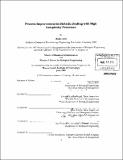| dc.contributor.advisor | Douglas Lauffenburger and Roy Welsch. | en_US |
| dc.contributor.author | Artzi, Hadas | en_US |
| dc.contributor.other | Leaders for Manufacturing Program. | en_US |
| dc.date.accessioned | 2011-02-23T14:34:54Z | |
| dc.date.available | 2011-02-23T14:34:54Z | |
| dc.date.copyright | 2009 | en_US |
| dc.date.issued | 2009 | en_US |
| dc.identifier.uri | http://hdl.handle.net/1721.1/61240 | |
| dc.description | Thesis (S.M.)--Massachusetts Institute of Technology, Dept. of Biological Engineering; and, (M.B.A.)--Massachusetts Institute of Technology, Sloan School of Management; in conjunction with the Leaders for Manufacturing Program at MIT, 2009. | en_US |
| dc.description | Cataloged from PDF version of thesis. | en_US |
| dc.description | Includes bibliographical references (p. 58-59). | en_US |
| dc.description.abstract | Across numerous conventional manufacturing sites, process improvement initiatives have been shown to increase production capabilities while decreasing costs - all without a required system- wide overhaul of the manufacturing site. For the biotech industry, this presents an interesting challenge. Through its upbringings as a highly interdisciplinary field, manufacturing unique biologics poses new and complex barriers to a process improvement initiative. However, though the challenge is daunting, process improvement in this field will in fact increase the reward two-fold. First, as with conventional manufacturing sites, costs and lead times will decrease while potentially increasing profits. Second, the ability to better produce more life improving drugs, and at a more affordable price to patients is in fact a reward unto itself - one that is at the forefront of Genzyme's culture. The turnaround process, where the manufacturing of biologics is halted in order to maintain a key manufacturing process, is a critical point in the production of biologics. The ability to reduce the time and variability of this process will directly and significantly increase Genzyme's manufacturing capacity. Currently, this turnaround process takes approximately 8±1 days, and it is hoped that it will be possible to attain a new turnaround time of 6±1 days through a number of process improvement methodologies such as lean manufacturing. The effects of implementation of a number of lean tools such as standardized workflow, visual management and an automation of the pressure-hold test were studied here. Our observations reveal that by introducing lean methodology the communication and coordination around the complex turnaround process improved, which led to a more manageable and repeatable process. By automating the pressure-hold test it will be possible to significantly reduce the test time and free up resources to perform additional turnaround activities. Even with these preliminary results, it is clear that the path to process improvement at Genzyme is possible, though not without its inherent difficulties. This work provides a critical framework for a number of techniques used, and serves as a case study in understanding the underlying rewards and difficulties with process improvement in the biotech industry. | en_US |
| dc.description.statementofresponsibility | by Hadas Artzi. | en_US |
| dc.format.extent | 59 p. | en_US |
| dc.language.iso | eng | en_US |
| dc.publisher | Massachusetts Institute of Technology | en_US |
| dc.rights | MIT theses may be protected by copyright. Please reuse MIT thesis content according to the MIT Libraries Permissions Policy, which is available through the URL provided. | en_US |
| dc.rights.uri | http://dspace.mit.edu/handle/1721.1/7582 | en_US |
| dc.subject | Biological Engineering. | en_US |
| dc.subject | Sloan School of Management. | en_US |
| dc.subject | Leaders for Manufacturing Program. | en_US |
| dc.title | Process Improvement in Biotech : Dealing with High Complexity Processes | en_US |
| dc.title.alternative | Process Improvement in Biotechnology : Dealing with High Complexity Processes | en_US |
| dc.type | Thesis | en_US |
| dc.description.degree | M.B.A. | en_US |
| dc.description.degree | S.M. | en_US |
| dc.contributor.department | Leaders for Manufacturing Program at MIT | en_US |
| dc.contributor.department | Massachusetts Institute of Technology. Department of Biological Engineering | |
| dc.contributor.department | Sloan School of Management | |
| dc.identifier.oclc | 701722323 | en_US |
